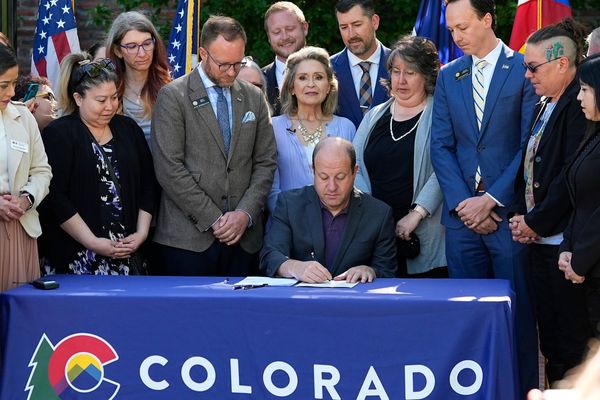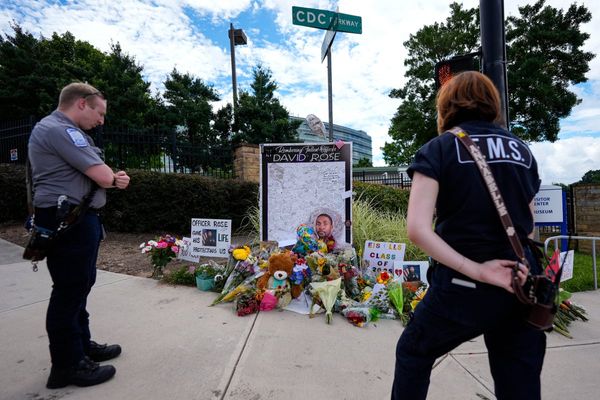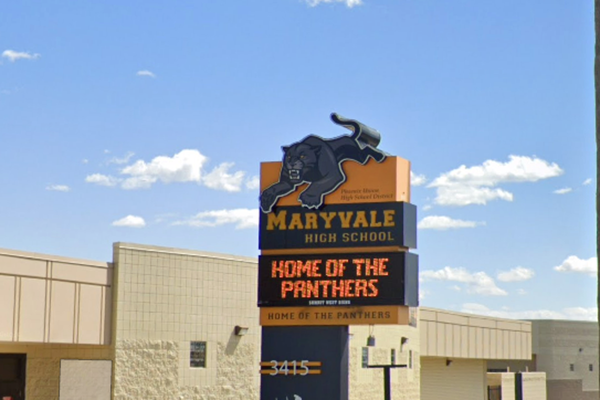
Ukraine’s president, Volodymyr Zelenskiy, toured the country to mark a newly declared “National Unity Day”, as cyber-attacks on the Ukrainian defence ministry stretched into a second day.
A key Zelenskiy ally also attacked western media for their coverage of the threat of a Russian invasion, saying fear-mongering reporting was as bad as Russian propaganda and was causing damage to the Ukrainian economy.
Ukrainians were asked to fly the national flag and sing the national anthem on Wednesday, to bolster spirits on the day US government briefings had warned a Russian invasion might start.
After the early hours of the morning passed without any military action, there was a lacklustre response in the capital to the National Unity Day call-up, with journalists almost outnumbering the sparse crowd gathered on Maidan, the central Kyiv square, to sing.
Other events included unfurling a 200 metre-long national flag at the sports stadium, and flashmobs in some cities, but none drew more than a few hundred people. TV stations launched a marathon of ‘patriotic’ programming.
US president, Joe Biden, says up to 150,000 Russian troops, well over half its ground forces, are gathered along Ukraine’s borders, and could move into the country now with little notice. The head of Nato warned on Wednesday that he had seen no evidence to support Russian claims it had pulled back troops from the border.
Moscow says the troops assembled for routine training missions, and has dismissed claims that it is planning an invasion, though it has promised it could “counterattack” if provoked.
On Wednesday, Zelenskiy observed military exercises in the western Rivne Oblast region, and was also due to visit frontlines in the east of the country, where Russia has armed and funded an insurgency since 2014.
In Rivne he also warned there was no evidence Russia had started drawing down troops along Ukraine’s borders, despite Moscow’s claim of redeployment.
“Honestly, we are reacting to the reality we have, and so far we do not see any withdrawal of troops. We only heard about it. So far, these are just statements,” he said.

The Ukrainian leader has regularly called for calm in the face of increasingly frantic western intelligence briefings about the risk of imminent military confrontation. But his latest comments were a reminder of the delicate balance he is trying to strike.
He is a relative political novice, who must stave off complacency, avoid looking weak and vulnerable, keep the economy running at a time of terrifying uncertainty, while also ensure his government doesn’t make any missteps that could give Moscow a pretext for intervention.
Cyber-attacks on the defence ministry and leading banks, which began on Tuesday, also continued on Wednesday. Moscow denied any role.
The already fragile Ukrainian economy has been badly knocked by the crisis, with embassies and many foreign citizens leaving Kyiv, and the government forced to make emergency insurance arrangements to keep international flights landing.
David Arakhamia, head of Zelenskiy’s Servant of the People party, claimed western media outlets were doing more damage to Ukraine than Russian state propagandists.
“Blatant fakes on CNN, Bloomberg, Wall Street Journal … We need to investigate this, because these are elements of a hybrid war,” he said, estimating that “hysteria” about a possible war is now costing the country $2bn to $3bn a month.
Iryna Gorlach contributed reporting







